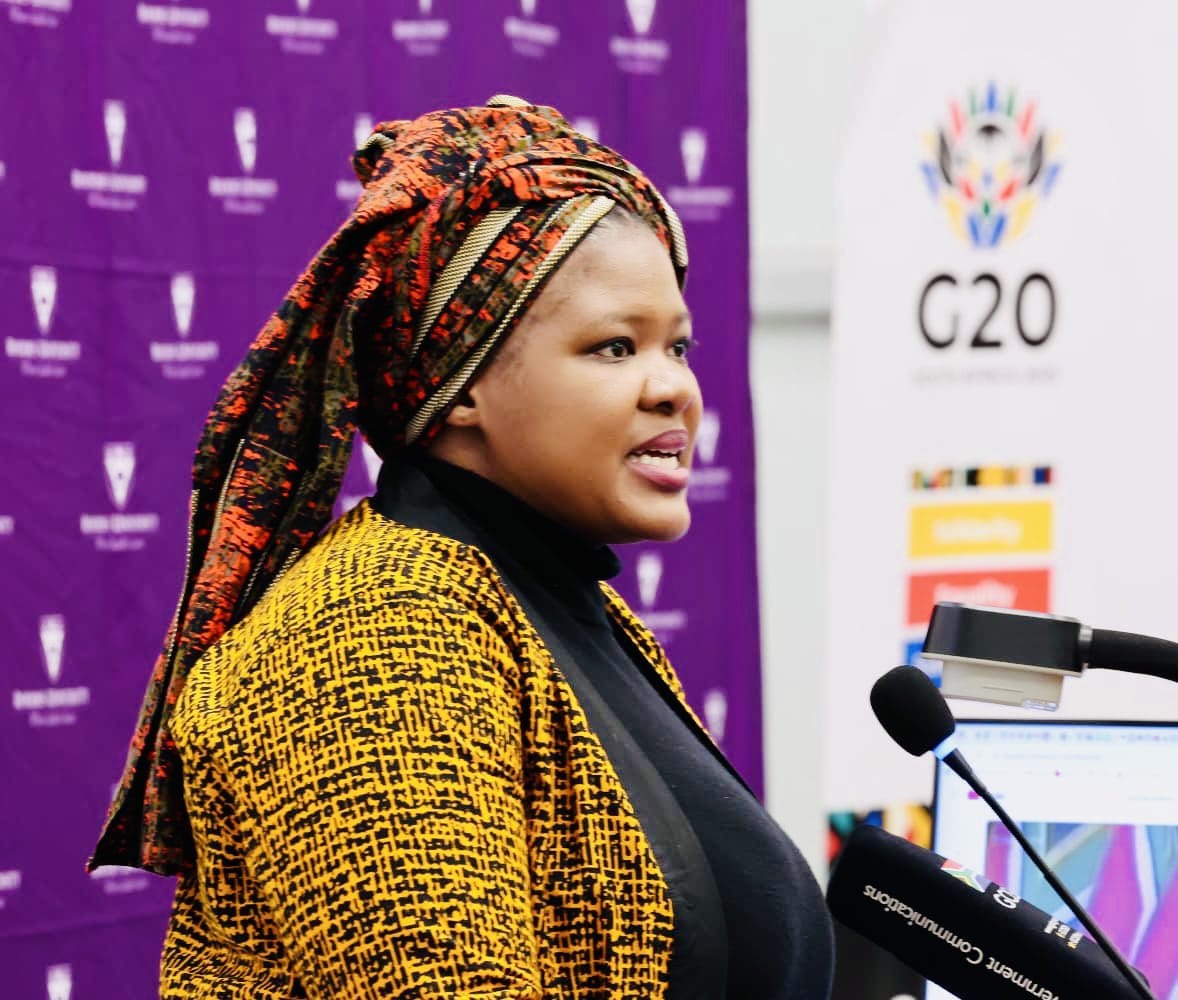
By: Ephreeda Banda
As South Africans celebrate Heritage Month, attention often turns to food, music, and traditional dress - the colourful symbols of culture. But beneath these celebrations lies an important question: how can heritage be a tool for transformation, and how can we ensure that all voices in our country are heard and recognised?
This question was at the heart of a public lecture at Rhodes University themed: "Governance, Community, Transformation, Indigenous Language and the Heritage Month" by Honourable Ms Nonceba Mhlauli, Deputy Minister in the Presidency. As a proud Rhodes University alumna, her journey from student activist to Deputy Minister in the Presidency is truly inspiring. She completed a Master of Arts (MA) with distinction from Rhodes University in 2016. Her thesis focused on the impact of language on access to public healthcare in South Africa, specifically looking at primary healthcare in the Grahamstown (now Makhanda) and Cofimvaba areas.
The lecture opened SEK Mqhayi Week, an initiative honouring the life and legacy of Samuel Edward Krune Mqhayi, the celebrated isiXhosa poet, intellectual, and cultural figure whose work continues to influence debates on governance, community, and transformation, set by the Rhodes University School of Languages and Literatures.
Heritage, language, and democracy
Hon. Mhlauli highlighted South Africa's democratic promise: "Our country belongs to all who live in it - Black and White." But she stressed that belonging is more than a legal or symbolic idea. Heritage, she said, is "a living covenant between generations." It requires recognising people and giving them the tools to participate fully in society, including access to knowledge and information in their languages.
"It is only when people are seen that they can participate in democracy, and this is possible through giving everyone access to information and knowledge when it is provided in their own language," she explained.
Her lecture connected Mqhayi's literary vision to modern governance, showing that culture, language, and democracy are deeply linked. Heritage, she emphasised, is not just about remembering the past; it is a living force that guides participation and accountability today.
Learning in isiXhosa
Hon. Mhlauli shared her academic experience, recalling that she was part of the first group of students in 2008 to formally study in isiXhosa. She highlighted her classmate, Dr Hleze Kunju, who went on to write his PhD thesis entirely in isiXhosa, a landmark achievement showing the intellectual potential of African languages. She also praised Rhodes University for promoting indigenous languages "Seeing isiXhosa embraced both in universities and on global technology platforms is inspiring and essential for our country's development," she said.
Policy, integrity, and development
Hon. Mhlauli also spoke about governance. "Policy is an intention, and the implementation of this is integrity," she said. For her, democracy is only meaningful when policies are implemented, and communities experience real benefits.
She underlined the importance of language in development. "We cannot speak about development within a country without addressing the matter of language," she said. African languages, she noted, are often unfairly seen as unsuitable for intellectual or technical work - language is the bridge between being seen and being heard. Without that bridge, development becomes exclusionary.
A full day of learning and reflection
The public lecture was the highlight of a day full of academic activity. In the morning, Mr X. Kondile gave a lecture to isiXhosa for Journalism students on The Influence of Social Media on African Languages in Journalism and Politics. He explored how digital platforms can challenge and strengthen African languages, encouraging students to think about the role of media in shaping identity and culture.
In the afternoon, Mr J. Mpupha spoke on The History and Dynamics of Traditional Music in Modern Society. He traced the evolution of traditional music and showed how it continues to influence modern culture, keeping heritage alive while inspiring new creativity.
Together with Hon. Mhlauli's evening lecture, these sessions marked a strong start to SEK Mqhayi Week, combining academic learning, cultural reflection, and public discussion.
Milestones and significance
This year's celebrations are significant. SEK Mqhayi would have turned 150, the same milestone being celebrated by Grocott's Mail, South Africa's oldest independent newspaper, founded in 1870. The shared anniversary honours two pillars of Eastern Cape heritage: Mqhayi's literary genius and Grocott's Mail's journalistic legacy, which have shaped the province over 150 years.
The week will continue with events exploring heritage, language, and community. On Tuesday, 23 September, students performed Ityala lamawele, one of Mqhayi's most influential works, adapted from his novel into a drama-in-action production. On Thursday, 25 September, the celebrations will culminate in the African Languages Academic Excellence Awards, with keynote speaker Dr Xolisa Tshongolo, Eastern Cape Senior Provincial Manager of PanSALB and isiXhosa analyst at Umhlobo Wenene FM. The programme will also include welcome remarks, introductions, and votes of thanks from Rhodes academics, with Akhona Mafani and Mbali Tanana as MCs.
Heritage as a living practice
Hon. Mhlauli reminded the audience that democracy and heritage are not static. They must be practised daily through recognition, listening, and fair participation. Honouring Mqhayi, she said, is a reminder that culture and language are not just for celebrations but are commitments to justice and inclusion across generations.
The first day of SEK Mqhayi Week showed this principle in action. Students, academics, and the community were invited to reflect, engage, and act through lectures, performances, and public dialogue. It was a day that celebrated heritage, promoted language, and connected culture to governance and development - a fitting start to a week dedicated to one of South Africa's literary giants.
